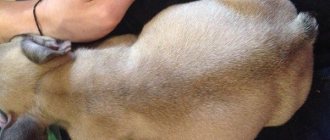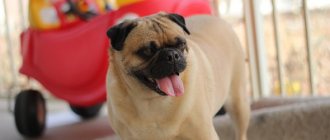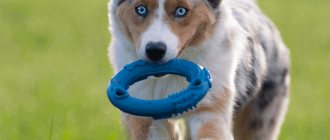In the new cycle, we will monitor what awaits us at each stage of development of a new household member. We want to help both those who made a conscious decision to take it under their roof, and those who received it on St. Nicholas Day, contrary to all the rules.
The third month of a puppy’s life is an important moment in the pet’s life, because it is then that the puppy should be protected from stress. It is during this period that the baby is simultaneously interested in the world and experiences fear. This is also the moment when the dog usually comes to our home. Puppy at 3 months, learn everything you need to know about puppy development during this period.
3rd month of a puppy’s life – food
There are commercial foods available on the market for certain age categories and even for certain breeds of puppies. If we have made this decision, then - as long as we trust the manufacturer of the food, and the veterinarian who is caring for the dog does not recommend otherwise - we do not need to add anything to it. During this period, it is worth investing in food from the top, or at least “upper-middle” shelf.
If we decide to cook our own food, remember that a growing body requires a lot of protein and minerals. Puppies of giant and... miniature breeds require a particularly careful approach in this matter. It should be remembered that overuse of supplements can be just as dangerous as late delivery of an important component: a vitamin or mineral. A veterinarian's consultation is required here.
We, of course, cannot play with a constant change of food: for two days the dog receives food from one company, for the next three days - boiled food, and then we offer him ready-made food, but from a completely different manufacturer.
At the age of three months, our pupil eats four times a day, but we are already preparing him for adulthood, and when he turns three months, we can limit himself to three meals.
© shutterstock
Good puppy feeding: basic points
When choosing the type of dog food (dry food or natural food), follow the rule - do not overfeed! Overeating can have serious consequences. It’s not worth growing your pet’s stomach to a large size; overfeeding will lead to poor health, joint problems, which is especially important for large breed dogs), and diseases of the internal organs.
When can you feed puppies? Before bedtime, if the dog is hungry. Offer your pet milk porridge, pamper it with meat, but do not make the ritual daily.
Feeding the puppy natural food
Many owners choose how to feed their dogs natural products. The reasons for choosing are as follows:
- natural food is cheaper than buying ready-made food;
- natural food gives confidence in the quality of food.
There are also a lot of disadvantages to feeding “human” food: you have to often go to the store and prepare food, because during the growth period the animal eats a lot.
The main motto is “Only natural”, isn’t the prospect of standing near the stove for a long time scary? We recommend paying attention to the freshness of the products. Meat that tastes good at a low price will play a cruel joke on the health of an eared baby. Poisoning from low-quality products is not uncommon. Remember that a puppy is a small child, so it is important to take food responsibly.
Second rule: you cannot feed your dog from the table! Signature aromatic borscht, seasoned with sour cream, cabbage rolls prepared according to a family recipe will appeal to people, but not to the puppy, and will cause problems with his well-being!
What can you feed your little friend?
1) Milk
A puppy's diet up to 4 months includes milk. This product provides vital elements for the growth and development of a foolish baby. Offer it raw and cook milk porridge. Not every milk will do. Choose goat, you can’t go wrong - there are rarely allergies to it, and it is easier to accept by the body. Having trouble finding a goat? You can give cow's milk, but dilute it with water to avoid intestinal upset.
Closer to six months, the amount of milk is reduced and gradually eliminated, replacing it with fermented milk products.
2) Dairy products
Proper feeding of puppies consists of many factors, including fermented milk. Good digestion and enrichment of the body with calcium are a wonderful reason to buy your pet cottage cheese, kefir, and low-fat sour cream. Whey is one of the most useful products, containing a huge amount of useful substances. According to the degree of usefulness, hard cheeses are distinguished, which are easy to use as a reward during training.
3) Meat
It must be present in the daily menu, at least 40% of the total diet. You can give raw, frozen, boiled, scalded meat. The priority is still given to raw meat, because the predator is being raised. What species can be included in a puppy's diet?
- skinless chicken;
- turkey;
- veal;
- beef;
- horsemeat;
- offal (cooked, raw).
The meat is given, cut into cubes, but not minced.
4) Fish and seafood
Offer it to your puppy twice a week. Give preference to sea fish (river fish is often hazardous to health): squid, shrimp, mackerel, hake, pollock. Do not mix with meat feedings.
5) Vegetables
Teach your baby to vegetables: they contain many vitamins. Mix with cottage cheese, porridge, grind on a fine grater, serve as a puree or simmer - and you have delicious dishes that are easily digestible. Pumpkin, carrots, zucchini, beets, and greens (onions, parsley, spinach) are useful.
6) Berries, fruits
Undoubtedly, they are useful, so feel free to include them in the diet, especially if your dog likes to crunch on an apple. Beware of fruits with pits containing prussic acid. It is not advisable to give bananas; the fruit will cause rapid weight gain. Grapes and currants cause bloating and the accumulation of harmful substances in the body.
7) Cereals
Let's make a reservation right away: porridge for puppies is excluded as the main element of the menu. Cereals are good for digestion, but you should not feed a growing dog only cereals. And as an addition to a dairy-meat diet, they are ideal.
What kind of cereals will your furry baby like?
- semolina;
- buckwheat;
- rice;
- oatmeal
When adding a certain type of porridge to the menu, monitor the puppy’s condition; if there is an intestinal disorder, exclude this type for a while.
 Eggs
Eggs
They serve as an excellent source of protein; it is recommended to include egg yolk in the diet 2 times a week. The dog will like omelettes and eggs in their pure form. Quail eggs are ideal.
Feeding puppies food
How to properly feed a puppy with dry food is something every owner will think about when they decide to make food the main way of feeding their little four-legged friend. Many people worry that dry food contains few important substances for harmonious growth and development. Manufacturers year after year develop food that can satisfy a dog’s hunger, provide the animal with all the vital vitamins and minerals, and give the animal smooth, shiny fur and strong teeth. Dry food is properly balanced, food is easy to give, following the instructions for the daily intake.
How to properly feed a puppy?
It is recommended to give the baby food in a soaked form. Thirty minutes before the intended feeding, the granules are poured with warm water to swell. The use of broths for this purpose is excluded.
How many times should you give your puppy dry food per day? Follow the recommendations on the packaging. The dose should not be exceeded: there is a high risk of overdosing on nutrients. It is important for the owner to know that dry food is very high in calories and differs from natural food, so the dog must be given granules strictly according to the instructions.
There are situations that require switching a puppy from natural food to commercial food. This should be done gradually, without sudden jumps, consult your veterinarian first.
The Zoomix store offers dry food of existing classes: from economy options to super premium. We advise you to look for the following brands:
- Hill's;
- Royal Canin;
- Eagle Pack;
- Purina Proplan;
- Genesis;
- Diamond.
- Popular foods
- New
- Stock
Food GO (Go) for puppies and dogs with sensitive digestion with Pollock
Food GO (Go) for puppies and dogs with sensitive digestion with Pollock
Price: from 1309
Dry puppy food PURINA PRO PLAN Small & Mini Puppy
Dry food for puppies PURINA PRO PLAN Small & Mini Puppy Complete dry food for puppies of small and toy breeds Purina® PRO PLAN® Small & Mini Puppy with…
Price: from 380
GO grain-free food for puppies and dogs with sensitive digestion with turkey
GO grain-free food for puppies and dogs with sensitive digestion with turkey
Price: from 1340
GO grain-free food for puppies and dogs with sensitive digestion with fresh duck
GO grain-free food for puppies and dogs with sensitive digestion with fresh duck
Price: from 1267
Canned food Four-legged gourmet Cold cuts for dogs with liver
Canned food Four-legged gourmet Assorted meats for dogs with liver Ingredients: liver (at least 50%), beef, heart, vegetable oil. Per 100 g of product: protein-12.2g, fat-5.5g, ash-2.5g,…
Price: from 56
Dr.Clauder's, Paw care with bees wax - Protective ointment for paws with beeswax.
Dr.Clauder's, Paw care with bees wax - Protective ointment for paws with beeswax. Dr.Clauder's, Paw care with bees wax - Protective ointment for paws with beeswax. Paw pads need care at any time of the year….
Price: from 356
Complete food for cats CLAN De File, with duck and greens in pouch sauce 85g
Complete food for cats CLAN De File, with duck and greens in pouch sauce 85g
Price: from 73
Eukanuba Adult All Breed wet diet with lamb in gravy for adult dogs
Eukanuba Adult All Breed wet diet with lamb in gravy for adult dogs Complete and balanced nutrition for adult dogs of all breeds over 1 year of age with high quality animal…
Price: from 57
GREENHEART-PREMIUMS SMALL BREEDS LOW ACTIVITY For small dogs with max. weight + 6 kg. and low levels of activity or are overweight
GREENHEART-PREMIUMS SMALL BREEDS LOW ACTIVITY For small dogs with max. weight + 6 kg. and low levels of activity or are overweight
Price: from 1200
Brit Fresh Beef With Pumpkin Puppy Large bones & Joints. Complete dry food with fresh beef and pumpkin for large breed puppies
Brit Fresh Beef With Pumpkin Puppy Large bones & Joints. Complete dry food with fresh beef and pumpkin for large breed puppies Brit Fresh Beef With Pumpkin Puppy Large Growth & Joints. Complete dry food with fresh beef and pumpkin for puppies...
Price: from 1350
Royal Canin Medium Puppy Canned food for medium-sized puppies up to 12 months
Royal Canin Medium Puppy Canned food for medium-sized puppies up to 12 months Complete canned food for puppies of medium-sized dogs (adult dog weight from 11 to 25 kg) up to 12 months…
Price: from 67
Royal Canin Mini Adult Canned food for small adult dogs up to 12 years old
Royal Canin Mini Adult Canned food for small adult dogs up to 12 years Canned complete food for small adult dogs (weighing from 1 to 10 kg) aged from 10 months to 12 years Mini…
Price: from 52
ALL PUPPY FOOD
Puppy at 3 months – physiology
The third month is a quarantine period, so you need to take care of your physiological needs at home. For most owners, this is a difficult time that requires patience and prudence. The more ambitious ones teach the puppy minimal toiletries. Yes, you can, but you must remember that we are dealing with a young creature who cannot control his physiological needs very much, he cares for them very often and does not tolerate coercion and discipline well. So we focus on praising and rewarding good behavior rather than preying on the puppy's mistakes to show him shocking displeasure.
We should also remember that we have a better chance of sending the puppy to the toilet with good results immediately after sleeping, playing or eating. Then the puppy will defecate more often, and then we will be able to praise him and reward him for going to the designated place for these tasks.
The dog's temporary toilet should be relatively large, discreetly placed in a corner.
What you need to teach a puppy at the age of 2-3 months
At first, it is best to keep your pet in a box or crib with sides; their presence will give a feeling of reliability and safety. Some people mistakenly refer to sheathing as a “dog prison,” but they are wrong. Of course, at first the pet may be dissatisfied that his movements are limited, but very soon he will understand that he is placed in a crate for sleeping or just resting - after all, any dog also needs privacy. Having accustomed your pet to being in a confined space, you can easily transport your baby in a car or to the veterinarian.
At 2-3 months, the puppy cannot fully control his bladder. And some breeds can’t hold back for up to six months. Toilet problems begin as soon as you bring a new family member home. Establish the correct toilet option from the very beginning and the puppy will adapt as soon as his organs begin to obey.
There are several options for dog toilet:
- special pallet;
- an “ex-feather” handle that the puppy will learn to open and exit;
- mini door leading to the courtyard;
- regular withdrawal by the owner.
You can choose the method that works best for your dog.
3rd month of a dog’s life – training
What a wonderful age: three-month-old puppies are still so attached to the idea that older and smarter ones are his ideal guardians that he hardly tries to distance himself without trying to establish contact. Moreover, he considers us a great authority, so if he is called, especially in a cheerful tone, announcing various attractions, he will lose his paws, rushing to the call. Let's take advantage of this by rewarding the dog for each such willing behavior with a game or a treat - the period of rebellion will still come, but it is worth making sure that the puppy has the best opportunity to come to the first call.
In addition, the puppy is stuck in a house where the number of distractions is limited. It's time to teach him his name.
Puppy 3 months – teeth change
Typically, complex teething does not begin until four months of age, but some puppies may begin teething before three months of age. However, even when the baby teeth are still firmly in place, the puppy behaves with everyone around him as if they were members of his canine family, so he plays, also in ritual games of “who will kill whom” or “how to hunt the victim.”
Our delicate, hairless limbs usually do not tolerate these manifestations of his interest. We walk around scratched by our puppy - experienced caregivers treat these noble scars condescendingly, but new owners get injured. I think we have a very dominant (or aggressive, mean, abusive - delete unnecessary) dog. If he bites now and does not respect us, then when he grows up, he will bite everyone in turn!
No panic. Such a small dog probably doesn't think about dominance and solving problems using its teeth. He uses them to understand the world. Like every small child, he loves to play, and dog play has a lot in common with the behavior of an adult - that is, the little one tries to imitate adults by hunting and fighting. He plucks his sharp baby teeth without malice - that's what nature dictates.
© shutterstock
This is still such a delicate creature, we cannot discipline her too much or show our displeasure. It’s worth trying - when the puppy grabs us too much - give him a toy instead of a hand.
3rd month of a dog’s life - socialization and quarantine
The period between the seventh and sixteenth week of life is extremely important for the puppy's psyche, since this is when he is most intensively socialized. He should explore the world and, with our help, find out that it is not dangerous, but interesting and friendly. Meanwhile, this is exactly when the puppy usually finds himself under compulsory release from home in the open air - that is, in post-vaccination quarantine, which lasts from the moment the puppy arrives with us. Regardless of whether he had an early or standard immunization program, he was not yet able to contact the outside world this month because he had not fully developed immunity. You need to be especially careful about places where other dogs might be and avoid direct contact with them.
According to the rules of prevention, caution is required. It's worse if we look at it from a behavioral point of view: isolation during this period is quite harmful. A familiar shepherd owner found a middle ground. She carried the puppy in a backpack. He was exposed to the outside world, did not expose himself to too much risk of infection, and felt safe snuggling with his pupil.
Behavior change
So, the 12-week-old puppy is approaching the end of the period of limited interaction with the outside. During this time, try to introduce the puppy to new people, things, and visit unfamiliar places together. Check your vaccinations; it is dangerous for an unvaccinated dog to come into contact with other animals or even just walk on the ground.
Trained dog











